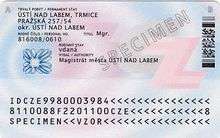Czech national identity card
| Czech national identity card (Občanský průkaz) | |
|---|---|
 The new ID1 format Czech identity card (with chip | |
| Date first issued | 2012-01-01 |
| Issued by |
|
| Valid in |
|
| Type of document |
Identity card, optional replacement for passport in the listed countries |





The Czech national identity card (Czech: Občanský průkaz, literally civic certificate; Czech pronunciation: [ˈoptʃanskiː ˈpɾuːkas]) is the identity document used in the Czech Republic (and formerly in Czechoslovakia), in addition to the Czech passport. It is issued to all citizens above 15 years of age, and every such person permanently living in the Czech Republic is required by law to hold a valid identity card.[1]
It is possible to use the ID card for travel within Europe (except Belarus, Russia, Ukraine, Turkey) as well as Georgia instead of a passport.
History

The first mandatory identity document was introduced during the German occupation, on 17 March 1939 in a decree made by Reichsprotektor Konstantin von Neurath. This document was based on the model of a similar document already in use in the Third Reich and included a photograph. Known as a legitimace, it was often nicknamed kennkarta.
During the communist regime (1948–89) this simple card developed into a booklet dozens of pages long. It contained such personal details as employment history and vaccination records.
Requirements
To acquire the machine-readable version of the card, a citizen must present either a currently valid card (in case of renewals), or a birth certificate and proof of citizenship. A photograph is made at the premises of the issuing authority; the form is filled out by an employee of the issuing authority and only requires the signature of the applicant.
To acquire the non-machine-readable version, a citizen must present a filled out application, two photographs, and either a currently valid card (in case of renewals) or a birth certificate and proof of citizenship.
Photograph
The photograph(s) must be 35x45 mm, correspond to the current look of the person, show the person looking forwards with the distance from the eyes to the chin at least 13 mm, in civil clothes, without dark glasses (except the blind), without any head cover (except for health/religious reasons, which may not cover the face in a way that makes the person difficult to distinguish). The photograph must be smooth.
Data included
Front side
- Surname
- First name
- Date of birth
- Birth number
- Nationality (Česká republika)
- Date of expiration
Reverse
- Place of birth
- Permanent address
- Birth name
- Other data
- Issuing authority and date of issue
The following information is printed if requested by the applicant (who must provide proof if necessary):
- Academic degree
The following information is printed unless the applicant explicitly opts out:
- Marital status
See also
References
- ↑ Law No. 328/1999 Coll. § 2, section 2